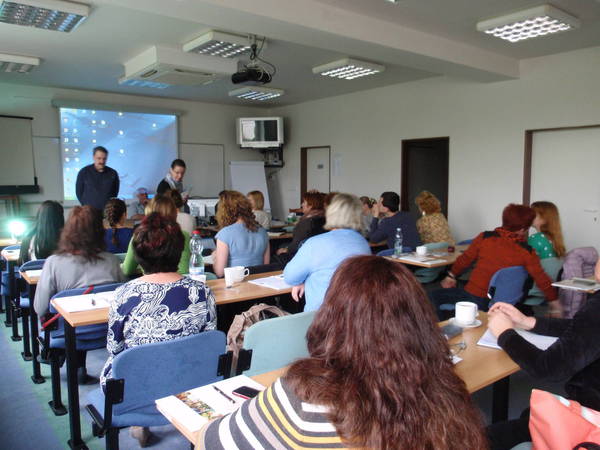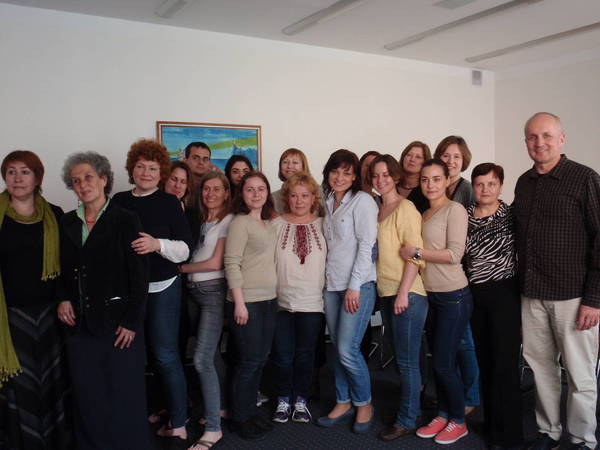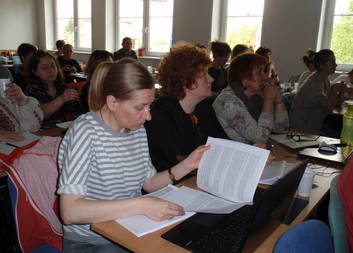In late April, psychologists met in Prague to discuss topics important in the local context, such as how to provide psychosocial assistance to prisoners, dealing with displaced persons fleeing the conflict in the east of the country, and supporting people suffering from severe disabilities.
This training followed the fall block which devoted to psychological assistance in emergency and crisis situations in Ukraine. This time psychologists from Ukraine were joined by their colleagues from Fire Rescue Service (FRS). Training attendants broadened their knowledge as first-responders, especially about working with internally displaced people and people after a serious injury. They were also familiarized with the subject of mourning and with people who have found themselves in captivity.
“Crimean Peninsula, Odessa, the eastern part of Ukraine,” distinguishes Natalia, the Ukrainian military psychologist working in the zone ATO (Anti-terrorist operation in Ukraine), Europe's largest countries and other places that have not trained interventionists in first-responder psychological assistance. "Since fall 2014, we have trained over three thousand people who provide assistance to soldiers and displaced people. Also they work with the families of victims who had suffered serious psychological trauma associated with the conflict." She is daily called to the cases where she has to prepare soldiers for departure to the front or works with those who return home, including the liberated prisoners.
What helps her herself in such hard role? She relies mostly on her faith. The importance of colleagues’ and relatives’ support is also crucial for Natalia. “Sometimes my children call me and ask me if I know how many days I've spent at home last month.” Usually, it's about three days; maximum five," says the petite woman with a sense of humor.
You must help me!
In addition to psychologists who work in the war zone, the crisis interventionists’ work influences internal exiles. Working with them is complicated by the variety of defense mechanisms used by individuals unconsciously to protect themselves. These include denying their emotions and feelings, pretending that nothing happened and the "I can handle everything" attitude. Some become aimless. They are aggressive verbally or physically. Adding to this uncomfortable environment in which exiles reside, the lack of privacy and frustration at their own helplessness, a lingering pathology gets established (i.e. unhealthy reactions or development).
Hana, the Psychologist, comes from a family with a refugee past in the northwestern Ukraine. She works with the clients who have, "an outstretched hand that does not reach the bread because they do not rise for it." She adds, "I often hear that we are obliged to take care of them even though they constantly complain that they are never satisfied with the service offered. They just sit and wait to be taken care of. It is terribly frustrating.”
How can responders cope with such clients? How can they deliver strength to them and yet do not get burnt out? According to Vera Roubalova, the Czech Psychotherapist working with refugees, it is good to look for something in common and build on it. For example, bring to a meeting "human subjects" such as care for children and family or leisure time. "It is essential to the helping person to take care of himself. Knowing where and what draw on for strength is the foundation. It is professional to be aware of my weaknesses and admit to myself and those around me that I am not able to work with some people."
Her colleague Frantisek Cihlar introduces himself as "intercultural worker" because he knows well that many of clients would shut the door before a psychologist. “The insane people need his help, not me,” describes the experience of direct work with refugees and migrants in the Czech Republic.
Magic number "three"
 During the week in April the trainees were introduced to several methods for how to work with clients.
During the week in April the trainees were introduced to several methods for how to work with clients.
Natalia devoted time to simulation captivity in the afternoon session. Participants were divided into two groups. A neutral group was formed by doctors and psychologists. The prisoners have to describe their own experience in the analysis of simulated events. Initial euphoria alternates with sadness, feelings of guilt combine with anger and desire for revenge over the fact that I have survived while others were not so lucky. The psychologist Jiri Frantisek Pruza previously worked in a foreign mission in Afghanistan. He used his example to describe the development of mental balance of man liberated from captivity and expressed by remembering the number "three" The method is based on his experiences working with soldiers who have returned from battle or captivity.
The happiness of soldier coming back to safety takes only three hours. The soldier meets with the commander and gets a thorough medical examination. Meeting with authority and soldier’s awards for his courage has a major impact on the development of a possible post-traumatic stress condition. "The soldier does not expect that flowers will be thrown on his head but ordinary pat on the shoulder and the recognition of the commitment. It has great strength," says Jiri Frantisek Pruza.
The period from three days to three weeks is essential for intensive psychological support. So-called flashbacks (the memories of past events) are common. The symptoms are the loss of appetite, depression, insomnia and apathy. At this stage, a psychologist works with the soldier individually or in a group depending on the number of people who found themselves in captivity.
After three months usually occurs desire to return to the battle zone and revenge. The important role characterizes the exposure of a personal conflict or whether is it "just a job" in the form of a comprehensive, political interest of the state. The psychologist mainly listens to and works with emotions that appear.
Three years is the time when one should be able to admit the fact that have been in captivity and is able to live with it. Similarly, it is with the man who met an accident and ended up in a wheelchair. It is a very tough task to accept the fact that I would never walk again. It is unacceptable for many people. What seems to be understandable is to adapt to the fact that human life has changed due to the event. He cannot do everything but still there are a lot of things which he can do “a little differently.”
Being a hero is not always worth it
Stepan Klen introduced another method of working with clients who work with the situations of crisis communication and with people who were in captivity. He also prepares humanitarian workers and diplomats to exit into dangerous areas. He himself was involved in a series of crises.
"Certain readiness is one of the basic assumptions of how to handle non-standard situations. At the beginning it is necessary to examine the potential risks and carefully consider whether to take place at all. Not everyone does. When we get into danger, it is appropriate to ensure a retreat, have a packed emergency bag and try to find a trustworthy person who you can stay with. It is advisable to leave and itemized letter or email which will contain information that would be useful in the event quest," said Stepan Klen.
 Those communicating with the imprisoned are advised to be inconspicuous, more collaborative, human and non-confrontational. Do not induce any argument that could destabilize an emotionally unstable imprisoner. It never pays off to be the hero. It draws the attention that captivity does not prefigure well. It is essential for the psychological state of a prisoner keeping mind occupied with something positive - think of a nice experience as much as possible to drive away the bothersome ones.
Those communicating with the imprisoned are advised to be inconspicuous, more collaborative, human and non-confrontational. Do not induce any argument that could destabilize an emotionally unstable imprisoner. It never pays off to be the hero. It draws the attention that captivity does not prefigure well. It is essential for the psychological state of a prisoner keeping mind occupied with something positive - think of a nice experience as much as possible to drive away the bothersome ones.
"Not only soldiers but also civilians participate the conflicts like the one in Ukraine. It is better to count on possible captivity anyways. Sometimes, the situation is influenced by the fact that we show up ourselves in the wrong place at the wrong time. This can occur even in everyday life," concluded Mr. Klen.
The meeting of Ukrainian and Czech specialists brought many on the professional and human level to both parties. Even the psychologists need to hear that they act still "normally" and are able to share difficult stories that encounter them daily in the difficult conditions of war. The Czech-Ukrainian cooperation will continue for the time being in a less formal way. Caritas and Fire Rescue Service of the Czech Republic also do not exclude the possibility of future cooperation in further education in order to increase the knowledge and skills of the local Ukrainian psychologists and social workers.







